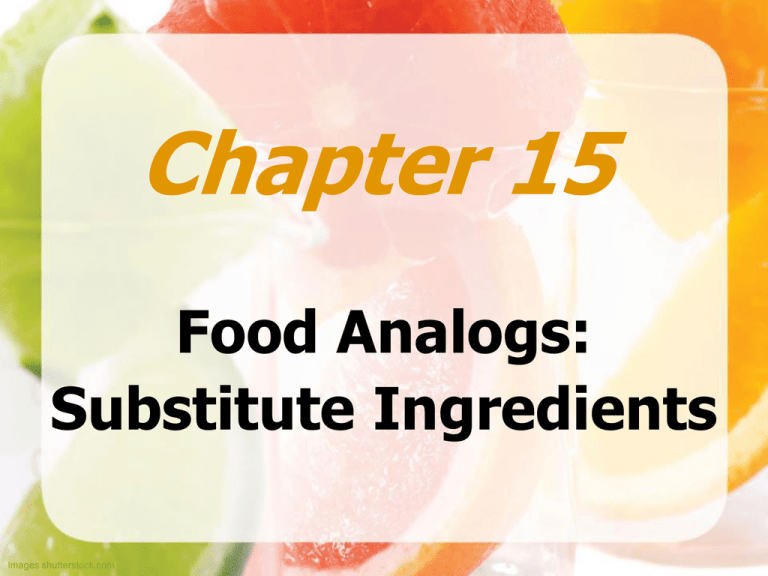depending
advertisement

Chapter 15 Food Analogs: Substitute Ingredients Images shutterstock.com Objectives • List the four main functions of food analogs. • Distinguish between nutritive and nonnutritive sweeteners. • Compare the performance of fat replacers to the performance of fat. • Describe advantages and disadvantages of potassium chloride as a salt substitute. © Goodheart-Willcox Co., Inc. Permission granted to reproduce for educational use only. Functions of Food Analogs • Food analogs are natural or manufactured substances used in place of traditional food products or ingredients • Food analogs are designed to – save money – change the nutritive value of food – improve the performance of foods and compounds continued © Goodheart-Willcox Co., Inc. Permission granted to reproduce for educational use only. Functions of Food Analogs • Food analogs are designed to – replace foods that are restricted for health reasons • Examples of food analogs include – texturized protein made from soybeans that costs less than meat and is lower in fat – artificial sweeteners that are ideal for people with diabetes © Goodheart-Willcox Co., Inc. Permission granted to reproduce for educational use only. The Pros and Cons of Food Analogs Pros Cons • viewed as drawbacks • offer low-fat and reduced-calorie options to the current food supply by some • keep prices of food products reasonable • are not “natural” • allow more food • may tempt some options for people with people to avoid eating heart disease, food a variety of foods allergies, and diabetes © Goodheart-Willcox Co., Inc. Permission granted to reproduce for educational use only. Sugar Substitutes • Consumer demand for lower-calorie foods tasting like high-calorie favorites prompted their development • The sugar substitutes – add sweetness without adding as many calories as sugar – are important in many restricted diets • Nonnutritive sweeteners provide no calories but nutritive sweeteners do © Goodheart-Willcox Co., Inc. Permission granted to reproduce for educational use only. Nonnutritive Sweeteners • Saccharin – remains stable in a wide range of foods under extreme processing conditions – was the first artificial sweetener – is 2,000 times sweeter than sugar – has a bitter aftertaste in high concentrations – has not been found to cause cancer in humans after 20 years of research continued © Goodheart-Willcox Co., Inc. Permission granted to reproduce for educational use only. Nonnutritive Sweeteners • Aspartame – is a dipeptide made from aspartic acid and the amino acid phenylalanine – tastes almost identical to sugar, but is 200 times sweeter – is safely consumed at levels up to 50 mg per kilogram of body weight per day – is used in drinks, puddings, gelatins, chewing gum, and frozen desserts continued © Goodheart-Willcox Co., Inc. Permission granted to reproduce for educational use only. Nonnutritive Sweeteners • Acesulfame K (acesulfame potassium) – is an organic salt – is 130 times sweeter than sugar – is stable in high temperatures – has no known side effects – is approved for use in chewing gum, drinks, instant tea and coffee, gelatins, and puddings continued © Goodheart-Willcox Co., Inc. Permission granted to reproduce for educational use only. Nonnutritive Sweeteners • Stevioside is – a natural extract from the leaves of a plant – up to 300 times sweeter than sugar – stable at high temperatures and in acids continued ©Heike Rau/Shutterstock.com © Goodheart-Willcox Co., Inc. Permission granted to reproduce for educational use only. Nonnutritive Sweeteners • Sucralose – is a disaccharide made in a 5-step process that replaces 3 hydroxyl groups with chlorine – is 600 times sweeter than sugar – cannot be digested, so it adds no calories – remains stable in processing, is soluble in water, and is easily added to foods continued © Goodheart-Willcox Co., Inc. Permission granted to reproduce for educational use only. Nonnutritive Sweeteners • Neotame – is from L-aspartic acid and L-phenylalanine combined with a methyl ester group and a neohexyl group – is 7,000 to 13,000 times sweeter than sugar – remains stable in high heat and is approved for baking applications – works as a flavor enhancer when used in low levels © Goodheart-Willcox Co., Inc. Permission granted to reproduce for educational use only. Nutritive Sweeteners • Polyols are a group of low-calorie sweeteners that – are also known as sweet alcohols – are found naturally in apples, berries, and plums – include sorbitol, mannitol, xylitol, maltitol, lactitol, erythritol, isolmalt, D-Tagatose, and hydrogenated starch hydrosylates (HSH) – helps control moisture content continued © Goodheart-Willcox Co., Inc. Permission granted to reproduce for educational use only. Nutritive Sweeteners • Polyols – improve texture and reduce browning – extend the shelf life – do not promote tooth decay – may act as a laxative if eaten in large amounts – have a synergistic effect in food – are found in baked goods, ice cream, candy, and chocolates © Goodheart-Willcox Co., Inc. Permission granted to reproduce for educational use only. New Developments in Sweeteners • Brazzein is a supersweet protein found in a vine plant that – is 2,000 times sweeter than sugar – remains heat stable at 98 C (208 F) for 2 hours – is stable across a wide pH range – can be genetically engineered in maize, then extracted through ordinary milling continued © Goodheart-Willcox Co., Inc. Permission granted to reproduce for educational use only. New Developments in Sweeteners • Artificial sweeteners are combined with a bulking agent to enhance the texture or thicken the consistency of food products – Polydextrose is a bulking agent that mimics the mouth feel of sugar and is used in reducedcalorie products – Other bulking agents include alginates, gum acacia, pectin, and xanthan gum © Goodheart-Willcox Co., Inc. Permission granted to reproduce for educational use only. Fat Substitutes • The average American consumes more fat than is recommended • Health concerns caused researchers to develop substitutes that mimic fat in foods – Food scientists look for ways to keep the positive qualities of fat while reducing or eliminating negative qualities © Goodheart-Willcox Co., Inc. Permission granted to reproduce for educational use only. Starch-Based Fat Replacers • These lower-calorie fat replacers – mimic the mouthfeel of fat – cannot create flaky texture in baked goods • The most common types are – vegetable gums, dextrins, maltodextrins, polydextrose, and pectin • Carrageenan helps low-fat hamburgers retain juices continued © Goodheart-Willcox Co., Inc. Permission granted to reproduce for educational use only. Starch-Based Fat Replacers • Oatrim, a hydrolyzed oat flour, is used commercially in baked goods • Cellulose gels are used in low-fat salad dressings ©GVictoria/Shutterstock.com © Goodheart-Willcox Co., Inc. Permission granted to reproduce for educational use only. Protein-Based Fat Replacers • Simplesse is made by a process called microparticulation – Milk and egg proteins are heated and processed to form balls that swell in water and mimic the mouthfeel of fat • This fat replacer is unsuitable for frying – Uses include frozen desserts, mayonnaise, salad dressings, yogurt, butter, puddings, cheese, and baked goods continued © Goodheart-Willcox Co., Inc. Permission granted to reproduce for educational use only. Protein-Based Fat Replacers • LITA is made from corn gluten • Trailblazer is made from egg white and milk • Starch and protein-based fat replacers release flavor all at once rather than gradually • Sugar is often increased in foods with fat replacers to make up for a lack of flavor © Goodheart-Willcox Co., Inc. Permission granted to reproduce for educational use only. Manufactured Fats • Olestra – is a sucrose polyester with 6 to 8 fatty acids attached at the site of hydroxyl groups on a sucrose molecule – can be solid or liquid depending on the fatty acids used – looks, feels, and performs like fat – cannot be digested by the body and therefore provides no calories continued © Goodheart-Willcox Co., Inc. Permission granted to reproduce for educational use only. Manufactured Fats • SALATRIM – is derived from soybean oil and other natural fat sources – is made of 3 fatty acids attached to a glycerol molecule – will not endure frying – provides about half the calories of fat – may cause abdominal discomfort, nausea, bloating, and headaches at 40 grams per day © Goodheart-Willcox Co., Inc. Permission granted to reproduce for educational use only. Salt Substitutes • Most Americans consume more sodium than the body needs • High levels of sodium are connected to high blood pressure, a risk factor for heart disease – This is the reason for salt substitute research • Sodium is often a hidden additive in processed foods continued © Goodheart-Willcox Co., Inc. Permission granted to reproduce for educational use only. Salt Substitutes • Potassium chloride – may benefit heart patients on low-sodium diets that need extra potassium – has a slightly bitter aftertaste • Potassium is a soft metal that combines with chlorine to form salts • Other salt substitutes include – sodium-free herbs and spices © Goodheart-Willcox Co., Inc. Permission granted to reproduce for educational use only. Recap • Food analogs have several functions including – saving money – altering the nutritive value of foods – improving food performance – offering an alternative option for restricted diets continued © Goodheart-Willcox Co., Inc. Permission granted to reproduce for educational use only. Recap • Nonnutritive sweeteners provide no calories, but nutritive sweeteners do • Fat replacers perform the same functions as fat in food products • Potassium chloride, herbs, and spices are salt-free alternatives that are used to season foods © Goodheart-Willcox Co., Inc. Permission granted to reproduce for educational use only.








